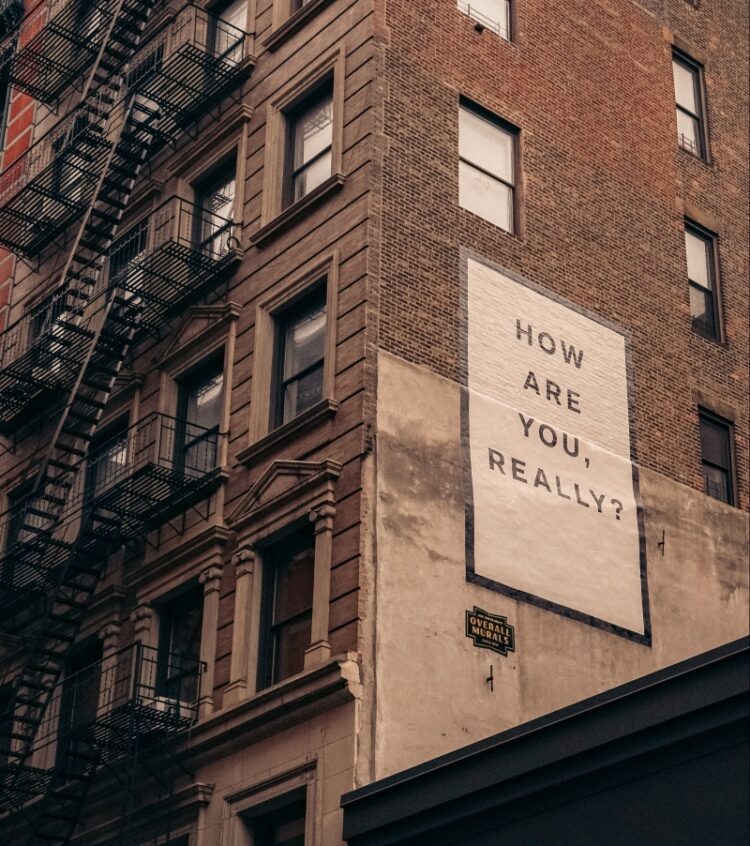Bestselling author Caroline Foran talks us through how to recognise anxiety and get a handle on anxious thoughts

With the global pandemic continuing to unfold, we can’t count how many times we’ve thought to ourselves, ‘is this really happening’. Many of us are understandably feeling more anxious than ever. Whether anxiety is a new feeling, or if it’s something that is familiar, you might be finding that it’s cropping up more often these days as we worry about our families, health, money, jobs – the list goes on.
We asked Caroline Foran what practical things we can do to try and get a handle on these feelings. Author of bestselling books Owning It, The Confidence Kit and Naked: Ten Truths To Change Your Life, Caroline knows a thing or two about identifying, accepting and handling anxious thoughts . Her insightful podcast Owning it: The Anxiety Podcast, deals with lots of aspects of anxiety head-on. You can find her episode about coping with Covid-19 here.

Q: It’s such an anxious time for everyone, how can we check in with our mental health and make sense of what we are feeling?
I think it’s really important to check in with how you’re feeling and make a habit of that now which will stand to you not just during our current crisis but forever more too. I do this by becoming aware of my breathing and the quality of my thoughts.
The main thing to note is that if you realise that you’re feeling anxious, you don’t need to panic about the presence of anxiety. It makes total sense right now. You have every reason to feel it. Anxiety is what we feel when our minds and bodies feel under threat in some way. It can be a threat to our physical wellbeing – the virus itself – or a threat to our emotional wellbeing.
If you are feeling overwhelmed, rest assured that it makes sense and you’re not alone. We are all in uncharted territory and it’s hard to know where things are going or what the outcome is. A feeling of being out of control is a defining characteristic of anxiety, as is the fact that our worries are future oriented.
Acknowledge that you feel anxiety, if you do, allow for it, and then reassure yourself that feeling anxious is okay, and that you have the power to manage it, and keep it from getting out of hand, from this point on.
Q: Lots of people are being effected in lots of ways, so they might be worried about their job, money, loved ones, health. Are there any methods we can use to try and separate out our worries and slow down these anxious thoughts?
Everyone has legitimate concerns right now – loss of income or loss of your job entirely is a very valid concern and of course it’s hard to say ‘don’t worry about it’. It’s also hard when you’re told to constantly think of the bigger picture and know that in the grand scheme of things you might be ‘fine’. Or that there will definitely be someone out there worse off than you.
I’ve always found it important to honour our feelings, whatever they are, and remember that it’s all relative.
You’re allowed to feel worried about how it’s affecting you or those you care most about. If you try to suppress those worries or negative thoughts and force positivity down your throat, they will bubble up under the surface and present themselves one way or another at some point.
My advice would be to take out a pen and paper. Get practical about your current situation – narrowing your focus in on you and not on how this affects the whole world which is not something we can personally manage. Allow yourself to confront the worst case scenarios and let all of that negative and worrisome energy come out. Then think of what you can do – practically – if the worst should happen.
One of the best ways to manage anxiety is to get proactive. I find it’s always helpful to write out a list of things we can control and things we can’t, focusing our energy on the former and allowing ourselves to be accepting of the latter.
Q: Lots of people are saying getting off social media/our phones will help, but it’s also a source of information and communication. What’s a good practise?
I have used the phrase ‘digital distancing’ alongside social distancing. Yes we still want the news and the updates but no, we don’t need them 24/7. We cannot address the problems of the entire world – stress and anxiety is what we experience when we feel that we don’t have the resources to handle what is presented to us.
Of course we don’t individually have the resources to handle this on a global scale, but we do have the power to manage our individual efforts. By distancing yourself from the phone and media, you are making your world smaller and easier to manage.
I check in on the news once in the morning. Never at night as when you’re exhausted you won’t have the same ability to rationalise and worried thoughts are more at risk of spiralling. I have also muted my WhatsApp groups and check in only when it suits me, rather than have the interruption all day long.
Choose one trusty news source and rely on that rather than consuming everything and if the constant updates – and the speculation – are really adding to your anxiety, go and change the settings on your phone so it only allows you a certain amount of time per app per day. I myself have asked my husband to keep me posted on a need to know basis. I don’t need to know what ‘could’ or ‘might’ happen. I can only deal with what is happening and what my role within that to protect myself and those I care about.
Q: A big part of the worry is the not knowing what’s to come. Will I lose my job? When will I see my loved ones again? What can we do to get a handle on those long-term worries?
I think this is where writing out worst case scenarios can be helpful. Allow yourself to confront your fears and put in place a strategy to cope in the event that that happens. Know that your perception about what might happen is a lot harder to deal with than your ability to cope when something is your reality. Don’t forget how good humans are at adapting, this is what will see us through.
Q: What activities/tools do you recommend trying, when you are feeling really anxious?
When I feel anxious I do any of the following, and it might seem incredibly simple, but it’s all that’s required to bring down that stress response:
I practise self-compassion, by asking myself what’s one nice thing I can do for myself right now. Self-compassion beats self-criticism every time because of the fact that it literally down regulates our stress response whereas self-criticism elevates it.
I go for a walk. I have a bath and light some candles. I watch something unrelated to anything I’m worried about on Netflix (comedy helps). I do some very simple breathing exercises, inhaling for a count of four, holding at the top for a count of four, exhaling slowly through the mouth over a count of 8 and holding at the bottom for a count of four.
I talk about the fact that I’m feeling anxious with someone I trust, I do not pretend that I’m not anxious; I address it head on. I acknowledge that it’s a feeling I’m sitting with right now, I say ‘that’s okay’, and then I engage in the aforementioned kinds of activities.
This comes back to my overall message across my books which is to ‘own it’. We can’t necessarily avoid it right now, we don’t need to, we need to accept it and own it and that in itself will take away half of the anxiety, as opposed to trying desperately not to feel it in the first place. I promise you, this never works.
For more form Caroline, see carolineforan.com.









